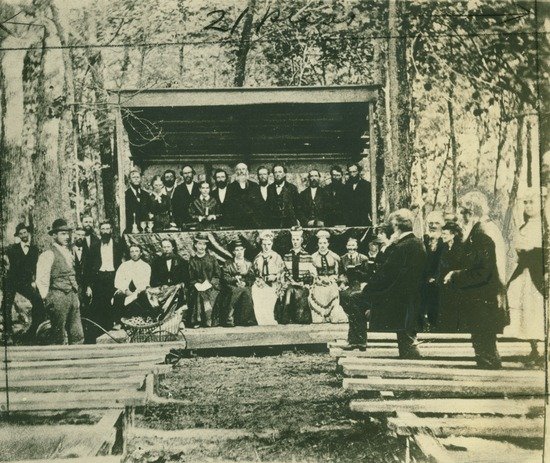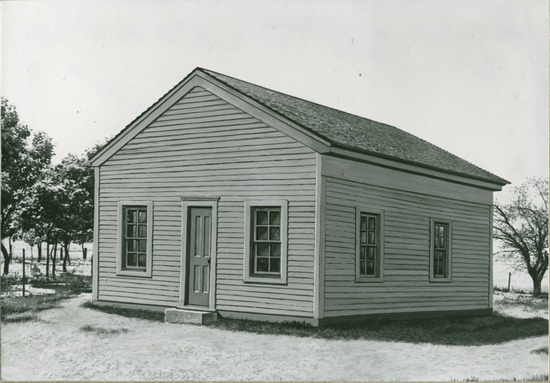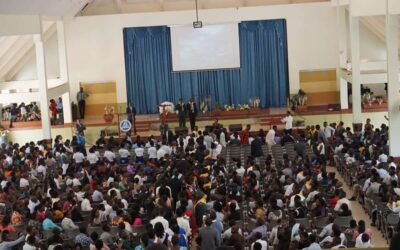Although camp meetings didn’t begin with the Seventh-day Adventist Church, they’re very common to Adventists.
Camp meeting is an extended event for Adventists (and non-Adventists) of all ages to gather and participate in spiritual seminars and activities. During the event, attendees often camp in tents, campers, or RVs.
Whether a weekend or ten days, the focus of the time is strengthening personal faith in Jesus and connecting the community of believers.
We’re going to dive into the following details:
- How camp meetings started
- What Adventist camp meetings are like today
- Why we still hold camp meetings
- Who can attend
- How to find a camp meeting near you
To begin, let’s take a brief tour of its history.
How camp meetings started

Courtesy of the Ellen G. White Estate, Inc.
The first camp meetings, as we know them today, started during a Presbyterian revival in Kentucky in the 1800s. At the time, another Protestant revival, the Second Great Awakening, was early underway.
The event was dubbed a “camp meeting” because the attendees camped out in their wagons and tents.
We don’t know how many attended, but at the same camp meeting the next year, between 20,000 and 30,000 people flocked to hear the preachers.1
The fervor quickly spread to other denominations, who began holding their own.
Adventists weren’t far behind.
Here’s how their camp meetings came about.
The first General Conference session had been held in 1868, but the people who attended came away disappointed at how business-like and dry it was. They had expected spiritual encouragement.2
James White, one of the founders of the Adventist Church, caught on to the sentiment. After some thinking, he suggested holding a “campmeeting,” an event that would be free from business and focus on spiritual matters.3
His plan was quickly put into action.
A couple months later, in September 1868, the first Adventist camp meeting took place in Wright, Michigan. It drew a crowd of over 2,000—among them James and Ellen White and J. N. Andrews. The meeting was so successful that they planned two more for that year in other states.4
Since then, Adventist camp meetings have become annual events around the world.
What an Adventist camp meeting is like today
Camp meetings today are in many ways similar to when they started. They’re generally held sometime between May and August. The programming still focuses on spiritual growth and revival. And many people still camp, too.
But unlike those of old, today’s participants don’t always stay in tents—they may bring an RV or camper, or rent a cabin. Many also stay in other people’s homes or in housing provided by the church.
Some meetings take place on school campuses, where camping isn’t always conducive. There, attendees might stay in dorm rooms and convene in a gym or auditorium instead of under big white tents.
Length
Although many meetings are still the traditional week in length, some are as long as nine days, and others are just a weekend or Sabbath convocation.
Cost
Camp meeting can be as inexpensive or as expensive as you want it to be. If you come just for the day and bring your own food, or stay at someone’s house, it’ll be free. But to eat at the cafeteria, have a campsite, or join certain workshops, you will most likely have to pay a fee to help cover costs.
Programs
 Another feature today is programs for different ages. Children can take part in classes geared for them, while adults can go to adult classes. But there is also time throughout the day for families to participate in events together.
Another feature today is programs for different ages. Children can take part in classes geared for them, while adults can go to adult classes. But there is also time throughout the day for families to participate in events together.
Let’s get a feel for what that might look like.
A typical camp meeting schedule
Every camp meeting will have its own variations in programming and time segments, but here’s a basic outline of a day:
- Prayer session. Rise and shine! This is generally the first event of the day and could be as early as 5:00 in the morning. Here, participants pray for each other and have a devotional time to kick off the day. However, this, as with every other event, is optional, so don’t worry if you’re not an early riser!
- Breakfast. Campers may cook their own, and usually, the cafeteria provides something for a fee.
- Activities and workshops. These activities focus on specific practical topics for Christians and are usually divided by age. They may last an hour or two. On Sabbath, this time slot is reserved for Sabbath School.
- Morning meeting. This event is typically two hours long and is divided by age to best suit the wide range of people. Classes are held for infants (0–2), kindergarteners (3–6), primary ages (7–9), juniors (10–12), earliteens (13–14), youth (15–18), and young adults (19+). Adults attend the main meeting and listen to a guest speaker. Over the years, these guest speakers have included well-known Adventists like Pastor Rei Kesis, Pastor Elizabeth Mokoro, Pastor David Mbaga. On Sabbath, this period is the main church service.
- Lunch. Once again, families may prepare their own midday meal or go to the cafeteria.
- Afternoon workshops. Like morning workshops, this section of the day could include many different activities for all age ranges.
- Afternoon meeting. Each age group will have its own activity or seminar for another hour or two.
- Supper and family time. This slot gives families the opportunity to spend some time together and catch up with friends.
- Evening meeting. One last event closes out the day. Sometimes, it’s a concert; sometimes, it’s a meeting like the others during the day. This usually ends by 9:00 pm or so.
Participants can pick and choose what activities and seminars they’d like to attend throughout the day to take advantage of the many benefits of the camp meeting program.
Why Adventists still hold camp meetings
The event serves many purposes, but the main one is to revive and enrich the spiritual lives of those who attend.5
Sometimes, the cares and frustrations and worries of life can seem overwhelming. But camp meeting offers a hiatus from all that to focus on what really matters: your spiritual life.6 It’s a time to rest and take in encouraging, wholesome thoughts.
But you might be thinking, I can do that at church or on my own. Why camp meeting?
Camp meeting isn’t just about individual spirituality. It’s also a huge community revival that connects the larger church body to encourage each other, build each other up, and learn together.
Friendship is a key aspect of that. At events like camp meeting, we have the chance to catch up with friends we don’t often see.
It also gives us a chance to reach out. You may run into people who aren’t Adventist—and maybe not even Christian. This is your opportunity to befriend and welcome them into the community, answering questions they might have along the way.
Who can attend camp meeting?
Anyone! All are welcome and encouraged to come, whether they attend an Adventist Church, another church, or no church at all.
Especially for those who are new to the Christian faith, camp meeting is a great way to meet Adventist Christians in a more casual setting. You don’t have to know, do, or be anything to learn about Jesus Christ and His love.
How to find a camp meeting near you
The best way to find your nearest yearly camp meeting is to ask your local pastor or someone else at your Adventist Church. You can also search online for ones in your state.
These are a few of the ones in the East-Central Africa Division of Seventh-day Adventists (ECD):
- Nairobi East Camp Meeting
- Kigali Camp meeting
- Kampala Camp Meeting
And if you can’t attend in person, some have livestream or video archives available.
Camp meeting has been part of Adventist culture for a long time. And though times have changed and we don’t camp in wagons anymore, one thing remains the same:
The need for humans to connect with Jesus and one another.
Camp meetings help meet that need.
If you’d like to learn about other Adventist ministries that bring people together,
- Spangler, J. R., “Workshops for Spiritual Revival,” Review and Herald, May 30, 1968. [↵]
- Poirier, Merle, “Camp Meeting,” Adventist Review.org. [↵]
- Ibid.[↵]
- Ibid. [↵]
- “Why Camp Meetings?” Ministry Magazine. [↵]
- Spangler, J. R., “Workshops for Spiritual Revival,” Review and Herald, May 30, 1968. [↵]
Related Articles
More Answers
Do Seventh-day Adventists Celebrate Holidays?
Wondering whether your Seventh-day Adventist classmate or coworker keeps the same holidays you do? Perhaps you want to include them in some festivities, but you also want to make sure you respect their beliefs.
What Is an Adventist Book Center (ABC)?
When you walk into any one of the many Adventist Book Center (ABC) locations, chances are you’ll be greeted by pleasant gospel music in the background, friendly employees, and row after row of Christian books, movies, Bibles, study guides, kids’ games, and more.
A Look at Adventist Colleges and Universities
On the outside, Seventh-day Adventist universities may not look much different than other college campuses. But the real differences are beneath the surface.
What Are Pathfinder and Adventurer Clubs?
What Are Pathfinder and Adventurer Clubs?Like the boy or girl scouts, Pathfinders and Adventurers learn about nature and life skills. But what makes these clubs special is their purpose to bring young people closer to Jesus. If you’ve wondered about Pathfinder or...
Do Seventh-day Adventists Believe Only They Will Go to Heaven?
No, Adventists definitely don’t believe they’re the only ones that will go to heaven. As a matter of fact, we don’t believe admittance into heaven is ever based on which church or denomination we belong to. People all over the world from different Christian denominations, religions, and walks of life will be welcomed by Jesus Christ.
How Adventists Handle Death and Funerals
Most Seventh-day Adventist funeral services are similar to those of other Protestant denominations, such as Methodists, Baptists, or Presbyterians, but you might find a few differences or unique nuances.
Does the Adventist Church Have Youth Ministry Programs?
Does the Adventist Church Have Youth Ministry Programs?The Seventh-day Adventist Church has been organizing and operating youth ministry programs since 1879. In our opinion, youth ministry is one of the most important ministries a church can have. Being a tween or a...
How does one become a Seventh-day Adventist?
To be a Seventh-day Adventist Christian means to accept Jesus Christ as Lord and Savior. This means to recognize that Jesus alone can save you from sin and death (Savior) and to give Him full authority over your life (Lord and Master).
What Are Adventist Evangelistic Meetings?
The Seventh-day Adventist Church puts a huge emphasis on sharing the gospel through evangelism, or sharing the gospel through preaching, teaching, and testimony. One of the ways we accomplish this is by organizing public events called evangelistic meetings.
What Do Adventists Offer for Young Adults?
What Do Adventists Offer for Young Adults?In recent years, the age group often classified as “young adults” has been trickier to engage. It’s been a significant concern for Christian churches around the world. Though interestingly enough, similar observations...
Does the Seventh-day Adventist Church Believe in Paying Tithe?
Seventh-day Adventists believe in paying tithe and offerings based on the biblical command and our commitment to being wise stewards of God’s resources. These donations help fund the mission of the Adventist Church by supporting pastors, missionaries, church expenses, and evangelistic projects, among other things.
The Leadership Structure of the Seventh-day Adventist Church
The Leadership Structure of the Seventh-day Adventist ChurchThe Seventh-day Adventist Church has a representative form of structure that connects its 90,000-plus congregations across the globe and gives its members a part in decision-making. Though the Church was...
Seventh-day Adventist World Population and Demographics
Did you know that the Seventh-day Adventist Church has more churches around the world than all the Pizza Hut, McDonald’s, and Subway restaurants combined?
Do I Need to be an Adventist to be Saved?
The answer to this question is simply, “no.”
All about Adventist Elementary Schools
The Seventh-day Adventist Church operates the largest Protestant education system in the world. A big part of this system is our K-8 elementary schools, or primary schools, as they’re known in other parts of the world.
Everything You Need to Know About Sabbath School
Sabbath School is the Bible study component of the church program at most Seventh-day Adventist Churches. It’s a time of Bible study on a specific topic or lesson. Instead of listening to a preacher, people interact with one another, making it a great opportunity for building friendships.
What Is Vespers?
Friday rolls around, and you’re spending time with your friends or relatives when they mention they’re going to vespers this evening.
Do Seventh-day Adventists Believe in Medical Care?
Adventists talk a lot about health principles and disease prevention. But how do we handle sickness and medical needs when they inevitably come along?
Do You Have to Be Vegetarian to Be Adventist?
Of course not. Membership in the Seventh-day Adventist Church has never included any dietary requirements.
How Do Adventists Do Baby Dedications?
For Christians, dedication ceremonies for babies are a special and memorable time for parents and the church. They often happen during a congregation’s main worship service when parents present their child before God and the church community, similar to how families did in the Bible.
What to Expect When You Go to an Adventist Church
If you’re attending an Adventist church for the first time, you may wonder what it’s really like. While each Adventist church is unique in its collective personality and local culture, Adventist church services are generally similar to most other Protestant Christian church services.
Everything You Need to Know About Sabbath Meals
For Seventh-day Adventists, sharing a Sabbath meal with friends and family is one of the most special and memorable parts of the Sabbath.
Why do Adventists Emphasize Religious Liberty?
Adventists see religious liberty as an essential human right. After all, God endowed humanity with freedom of choice from the very beginning. So we believe it’s best for governments to also support their citizens’ rights to worship based on their convictions.
All About Seventh-day Adventist Colporteurs
The Seventh-day Adventist Church uses a variety of methods to spread the hope of the gospel to the world. One of these ways is through colporteuring, also called “canvassing” or “literature evangelism.”
The Benefits of A Seventh-day Adventist Academy
Adventist academies are high schools (grades 9-12) that are owned and operated by the Seventh-day Adventist Church.
Who Are Adventists
The Seventh-day Adventist Church—“Adventists” for short—is a Christian denomination of ordinary people who seek to follow Jesus and live out His mission in this world. Established in 1863, we hold to the Protestant principle of sola scriptura, which means the Bible guides everything we do.
Evangelism
Evangelism is simply sharing the truths of the Bible with someone else. And Adventists are all into it.
Adventist Pastors
What is the role of a pastor in the Adventist Church?
Do Adventists Celebrate Christmas?
In many parts of the world, Seventh-day Adventists celebrate Christmas as a way to remember the birth of Christ. In certain parts of Africa, though, Christmas is much more low-key for Adventists, having less to do with religion and more to do with family time.
Didn’t find your answer? Ask us!
We understand your concern of having questions but not knowing who to ask—we’ve felt it ourselves. When you’re ready to learn more about Adventists, send us a question! We know a thing or two about Adventists.
































